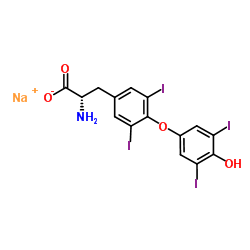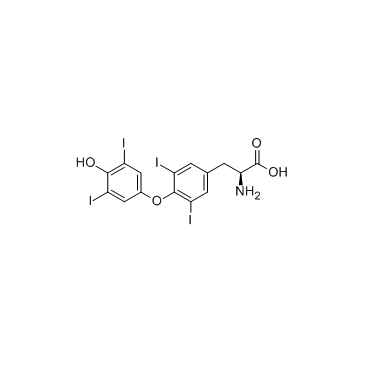CHEMICAL IDENTIFICATION
-
RTECS NUMBER :
-
XP3583000
-
CHEMICAL NAME :
-
Thyroxine, monosodium salt, L-
-
CAS REGISTRY NUMBER :
-
55-03-8
-
LAST UPDATED :
-
199710
-
DATA ITEMS CITED :
-
15
-
MOLECULAR FORMULA :
-
C15-H11-I4-N-O4.Na
-
MOLECULAR WEIGHT :
-
799.86
-
WISWESSER LINE NOTATION :
-
QR BI FI DOR BI FI D1YZVO &-NA-
HEALTH HAZARD DATA
ACUTE TOXICITY DATA
-
TYPE OF TEST :
-
TDLo - Lowest published toxic dose
-
ROUTE OF EXPOSURE :
-
Oral
-
SPECIES OBSERVED :
-
Human - woman
-
DOSE/DURATION :
-
14 mg/kg/14D-I
-
TOXIC EFFECTS :
-
Behavioral - coma Cardiac - change in rate Gastrointestinal - hypermotility, diarrhea
-
REFERENCE :
-
AJEMEN American Journal of Emergency Medicine. (WB Saunders, Philadelphia, PA) V.1- 1983- Volume(issue)/page/year: 3,297,1985
-
TYPE OF TEST :
-
TDLo - Lowest published toxic dose
-
ROUTE OF EXPOSURE :
-
Oral
-
SPECIES OBSERVED :
-
Human - child
-
DOSE/DURATION :
-
900 ug/kg
-
TOXIC EFFECTS :
-
Behavioral - convulsions or effect on seizure threshold Endocrine - evidence of thyroid hypofunction
-
REFERENCE :
-
AJEMEN American Journal of Emergency Medicine. (WB Saunders, Philadelphia, PA) V.1- 1983- Volume(issue)/page/year: 3,297,1985
-
TYPE OF TEST :
-
TDLo - Lowest published toxic dose
-
ROUTE OF EXPOSURE :
-
Oral
-
SPECIES OBSERVED :
-
Human - child
-
DOSE/DURATION :
-
449 ug/kg
-
TOXIC EFFECTS :
-
Cardiac - pulse rate increase, without fall in BP Vascular - BP elevation not characterized in autonomic section
-
REFERENCE :
-
AEMED3 Annals of Emergency Medicine. (American College of Emergency Physicians, 1125 Executive Circle, Irving, TX 75038) Volume(issue)/page/year: 14,1114,1985
-
TYPE OF TEST :
-
TDLo - Lowest published toxic dose
-
ROUTE OF EXPOSURE :
-
Oral
-
SPECIES OBSERVED :
-
Human - woman
-
DOSE/DURATION :
-
117 ug/kg/60D-I
-
TOXIC EFFECTS :
-
Behavioral - headache
-
REFERENCE :
-
AJDCAI American Journal of Diseases of Children. (AMA, 535 N. Dearborn St., Chicago, IL 60610) V.1-80(3), 1911-50; V.100- 1960- Volume(issue)/page/year: 138,927,1984
-
TYPE OF TEST :
-
TDLo - Lowest published toxic dose
-
ROUTE OF EXPOSURE :
-
Oral
-
SPECIES OBSERVED :
-
Human - child
-
DOSE/DURATION :
-
20 ug/kg
-
TOXIC EFFECTS :
-
Behavioral - excitement Cardiac - pulse rate increase, without fall in BP Nutritional and Gross Metabolic - body temperature increase
-
REFERENCE :
-
AJDCAI American Journal of Diseases of Children. (AMA, 535 N. Dearborn St., Chicago, IL 60610) V.1-80(3), 1911-50; V.100- 1960- Volume(issue)/page/year: 141,1025,1987
-
TYPE OF TEST :
-
LD50 - Lethal dose, 50 percent kill
-
ROUTE OF EXPOSURE :
-
Intraperitoneal
-
SPECIES OBSERVED :
-
Rodent - rat
-
DOSE/DURATION :
-
20 mg/kg
-
TOXIC EFFECTS :
-
Details of toxic effects not reported other than lethal dose value
-
REFERENCE :
-
NIIRDN Drugs in Japan (Ethical Drugs). (Yakugyo Jiho Co., Ltd., Tokyo, Japan) Volume(issue)/page/year: 6,905,1982
-
TYPE OF TEST :
-
LD50 - Lethal dose, 50 percent kill
-
ROUTE OF EXPOSURE :
-
Subcutaneous
-
SPECIES OBSERVED :
-
Rodent - rat
-
DOSE/DURATION :
-
50 mg/kg
-
TOXIC EFFECTS :
-
Details of toxic effects not reported other than lethal dose value
-
REFERENCE :
-
NIIRDN Drugs in Japan (Ethical Drugs). (Yakugyo Jiho Co., Ltd., Tokyo, Japan) Volume(issue)/page/year: 6,905,1982 ** REPRODUCTIVE DATA **
-
TYPE OF TEST :
-
TDLo - Lowest published toxic dose
-
ROUTE OF EXPOSURE :
-
Subcutaneous
-
DOSE :
-
6750 ug/kg
-
SEX/DURATION :
-
female 10 day(s) pre-mating
-
TOXIC EFFECTS :
-
Reproductive - Effects on Newborn - live birth index (measured after birth) Reproductive - Effects on Newborn - other postnatal measures or effects
-
REFERENCE :
-
BNEOBV Biology of the Neonate. (S. Karger Pub., Inc., 79 Fifth Ave., New York, NY 10003) V.15- 1970- Volume(issue)/page/year: 31,71,1977
-
TYPE OF TEST :
-
TDLo - Lowest published toxic dose
-
ROUTE OF EXPOSURE :
-
Subcutaneous
-
DOSE :
-
2 mg/kg
-
SEX/DURATION :
-
female 9-10 day(s) after conception
-
TOXIC EFFECTS :
-
Reproductive - Effects on Embryo or Fetus - fetal death
-
REFERENCE :
-
DPTHDL Developmental Pharmacology and Therapeutics. (S. Karger Pub., Inc., 79 Fifth Ave., New York, NY 10003) V.1- 1980- Volume(issue)/page/year: 2,17,1981
-
TYPE OF TEST :
-
TDLo - Lowest published toxic dose
-
ROUTE OF EXPOSURE :
-
Parenteral
-
DOSE :
-
8 mg/kg
-
SEX/DURATION :
-
female 9-10 day(s) after conception
-
TOXIC EFFECTS :
-
Reproductive - Fertility - litter size (e.g. # fetuses per litter; measured before birth) Reproductive - Effects on Embryo or Fetus - fetal death
-
REFERENCE :
-
JDREAF Journal of Dental Research. (International Assoc. for Dental Research, 734 15th St., NW, Suite 809, Washington, DC 20005) V.1- 1919- Volume(issue)/page/year: 53(Spec Iss),541,1974
-
TYPE OF TEST :
-
TDLo - Lowest published toxic dose
-
ROUTE OF EXPOSURE :
-
Intramuscular
-
DOSE :
-
30 ug/kg
-
SEX/DURATION :
-
female 28-30 day(s) after conception
-
TOXIC EFFECTS :
-
Reproductive - Specific Developmental Abnormalities - respiratory system Reproductive - Effects on Newborn - stillbirth
-
REFERENCE :
-
BNEOBV Biology of the Neonate. (S. Karger Pub., Inc., 79 Fifth Ave., New York, NY 10003) V.15- 1970- Volume(issue)/page/year: 22,161,1973 *** NIOSH STANDARDS DEVELOPMENT AND SURVEILLANCE DATA *** NIOSH OCCUPATIONAL EXPOSURE SURVEY DATA : NOHS - National Occupational Hazard Survey (1974) NOHS Hazard Code - 80525 No. of Facilities: 68 (estimated) No. of Industries: 1 No. of Occupations: 6 No. of Employees: 2770 (estimated) NOES - National Occupational Exposure Survey (1983) NOES Hazard Code - 80525 No. of Facilities: 131 (estimated) No. of Industries: 1 No. of Occupations: 4 No. of Employees: 2447 (estimated) No. of Female Employees: 1413 (estimated)
|




